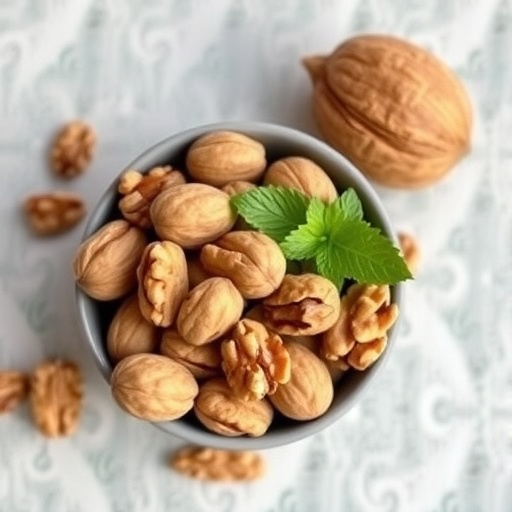
In a groundbreaking clinical trial conducted by researchers at the University of Connecticut School of Medicine, compelling new evidence has emerged highlighting the profound health benefits of walnut consumption. Published on the cover of the April 2025 issue of Cancer Prevention Research, the study elucidates the intricate relationship between walnuts, systemic inflammation, and colon cancer risk reduction. This meticulously designed randomized controlled trial sheds light on the biochemical mechanisms by which walnuts contribute to anti-inflammatory pathways and potential cancer-preventive effects, positioning walnuts as a promising dietary intervention in oncological and inflammatory health contexts.
Central to these discoveries are ellagitannins, a particular class of plant-derived polyphenols richly found in walnuts. Unlike many other dietary polyphenols, ellagitannins undergo exclusive metabolism by the gut microbiome, yielding a spectrum of metabolites collectively termed urolithins. Among these, urolithin A has garnered significant scientific interest due to its potent anti-inflammatory properties. Researchers led by Dr. Daniel W. Rosenberg have demonstrated that urolithin A can modulate inflammatory processes systemically, impacting not only peripheral blood markers but also the cellular environment within colonic tissues, which is critical in colorectal carcinogenesis.
Dr. Rosenberg, who holds the HealthNet Chair in Cancer Biology and serves as an Investigator in the Center for Molecular Oncology, has harnessed his extensive expertise developed over more than a decade to guide this pivotal trial. Prior preclinical studies had hinted at the anti-cancer benefits of walnuts in cancer-prone murine models, but this clinical investigation marks a vital translation to human populations at elevated risk for colon cancer, providing robust evidence for the nutraceutical potential of walnut ellagitannins via microbiome-mediated metabolism.
The study enrolled thirty-nine participants aged 40 to 65, all referred from UConn Health’s Division of Gastroenterology due to elevated colon cancer risk profiles. After rigorous initial screening and dietary standardization to eliminate confounding sources of ellagitannins, participants underwent a carefully monitored dietary intervention involving controlled walnut consumption over a three-week period. This protocol was followed by high-definition colonoscopies, enabling detailed visualization and tissue sampling for downstream molecular analysis.
One of the study’s most remarkable findings was the positive correlation between urolithin A levels in patients’ urine and serum levels of peptide YY, a gut-derived peptide implicated in the inhibition of colorectal cancer progression. This correlation suggests that enhanced urolithin production via gut microbial activity may have downstream effects on peptide YY expression, reinforcing the multifaceted role of diet-microbiome interactions in cancer prevention mechanisms. Moreover, significant reductions in systemic inflammatory markers were documented, particularly pronounced in obese individuals, a subgroup often exhibiting heightened baseline inflammatory states and altered microbial profiles.
Advancing beyond systemic markers, the UConn research team employed cutting-edge high-dimensional spatial imaging technology to interrogate the microenvironment of colon polyps excised post-intervention. This sophisticated imaging enabled unprecedented insight into cellular interactions and protein expression within polyp tissues, revealing that participants with higher urolithin A levels exhibited marked decreases in pro-inflammatory and pro-cancerous proteins. Notably, levels of vimentin, a protein linked to epithelial-mesenchymal transition and advanced tumor phenotypes in colorectal cancer, were substantially reduced.
This multidimensional approach elucidates a compelling biological narrative: walnut-derived ellagitannins, through gut microbiome metabolism, produce urolithin A, which exerts localized anti-inflammatory and anti-carcinogenic effects within the colon, while simultaneously modulating systemic inflammatory processes. These findings not only corroborate earlier animal model data but also provide strong mechanistic evidence supporting dietary walnuts as a non-invasive, accessible strategy to modulate colon cancer risk.
The implications of this research extend into preventive medicine and nutritional epidemiology, emphasizing the importance of personalized nutrition. The differential capacity of individuals’ gut microbiota to convert ellagitannins into bioactive urolithins underlines the potential for precision dietary recommendations tailored to microbiome characteristics, a frontier in optimizing cancer prevention strategies.
Importantly, the study also highlights public health relevance, given walnuts’ palatability, availability, and safety profile. The minimal risk associated with walnut consumption juxtaposed against the outlined benefits suggests a straightforward, practical intervention that could be easily incorporated into daily dietary routines to complement existing cancer risk reduction efforts.
The research was made possible through generous funding from the American Institute for Cancer Research, the California Walnut Commission, and the National Cancer Institute. This support underscores the collaborative effort bridging nutritional science, oncology, and microbiomics to uncover novel preventive measures for cancer and chronic inflammatory diseases.
Looking forward, Dr. Rosenberg and his multidisciplinary team advocate for broader clinical studies to validate these findings across diverse populations and to further unravel the molecular underpinnings of the walnut-microbiome-inflammation axis. The potential for urolithin A or derivative compounds to serve as biomarkers or therapeutic agents is a promising avenue poised to transform nutrition-based preventive oncology.
In conclusion, this landmark study encapsulates the remarkable potential of dietary walnuts to favorably transform the inflammatory milieu associated with colon carcinogenesis. Through a sophisticated interplay of gut microbiome metabolism and systemic immune modulation, walnuts emerge not only as a nutrient-rich food but also as a functional component with tangible anti-inflammatory and anti-cancer benefits. For individuals seeking accessible means to reduce their cancer risk and enhance colon health, incorporating a daily handful of walnuts could be a scientifically grounded, impactful choice.
Subject of Research: People
Article Title: Systemic Inflammation and the Inflammatory Context of the Colonic Microenvironment Are Improved by Urolithin A
News Publication Date: 1-Apr-2025
Web References: https://aacrjournals.org/cancerpreventionresearch/article/18/4/235/754306/Systemic-Inflammation-and-the-Inflammatory-Context
Keywords: Colon cancer, Inflammation, Preventive medicine
Tags: anti-inflammatory dietary interventionsCancer Prevention Research studycolon cancer risk reductioncolorectal carcinogenesis preventiondietary polyphenols and healthellagitannins and urolithinsgut microbiome and polyphenolsoncology and nutrition researchrandomized controlled trial on walnutssystemic inflammation and dieturolithin A and inflammationwalnut health benefits





